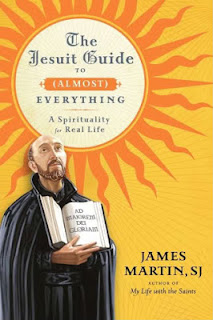Parking the Bus
"...So God blessed the seventh day and hallowed it, because on it God rested from all the work he had done in creation..." Gen 2.3
The "School Bus on the Road to Emmaus" is ready to park until September, and while this blog is meant for anyone seeking deeper connections with God in their day to day living, I've been trying to give special attention to those who have been called to a life in Catholic education. And so we will pause.
Take time
Partake in Sabbath
As educators, we often go racing through our days (and nights) at breakneck speed, until we hobble to the finish line in June and take at east two weeks to recover and feel normal again. But, if we follow God's example, 1/7th of our time should be spent in Sabbath!!!
There's something very wrong with the pace of our lives. If you find you experience exhausting overdrive, take some time this summer to reflect on how you can change the pattern. Perhaps you need more exercise? A better diet? Less coffee?
When God finished all of creation, God didn't collapse in a heap. God looked at it all and blessed it, then God rested.
Was your school year a blessing or a curse? If it was the latter, take some summer Sabbath to discern God's presence even in the shadow times of the past year.
Because he was there as well. He is always there for you.
++++++++++++++++++++++++++++++
As you move into the peaceful days of summer, I thought I would give some suggestions for some hammock reading. Yes, I know, it is usually meant for mind popcorn- light, airy reading with very little nutritional impact. I promise my suggestions will not be too heavy, but will beB a faith lift. Here are some of my favorites, and one I'm currently reading...
The Power of Pause
I have it as an audio book as well, and will listen to a chapter before bed. If you find that life seems too busy and you don't seem to have time for the "spiritual life", this is the book for you! To get the book or the audio cd, go to Terry's website at www.terryhershey.com.
Believing in Jesus
If you are looking for a book to help you understand what it means to be a Catholic Christian, but don't want to tackle something like The Catechism of the Catholic Church, then I suggest this by Leonard Foley. With over a half a million sold (wow!), Fr. Foley presents the tenets of our faith in "plain English". Fr. Foley was the editor of the very popular Catholic Update, and continues to write some of the issues. Not only a good read, Believing in Jesus will become a handy reference for you as well. You can get Believing in Jesus at Amazon.com
The Jesuit Guide to (Almost) Everything
This is my current read, and I am thoroughly enjoying it! This was a New York Times best seller (who knew?) written by a very popular speaker, and a Jesuit himself, Fr. James Martin. A gifted story-teller, Martin demystifies Ignatian spirituality, and invites his readers to find God in the everyday...
Pray-as-you-go
Here is one more gift for your summer Sabbath. Anyone who has attended one of my workshops or courses will have heard me recommend "Pray-as-you-go". This is a website from an English Jesuit community that has created daily downloads for your MP3 player. It follows the "lectio divina" style of prayer, where you listen to music (sometimes ancient, sometimes modern), one of the readings of the day, and questions to enhance your prayer time. Perfect for the holiday traveler! Click on http://www.pray-as-you-go.org/
Finally, as you break from the everyday busyness, avoid the temptation to "break" from Sunday Eucharist. It is easy to think that "I'm finding God by the campfire", but as Catholic Christians, our encounter with the Risen Lord is at Mass. This is our nourishment. In Christ we find rest. He is our true Sabbath.
Blessings and Peace for a safe and restful summer Sabbath!
Michael
If you have any thoughts for future blog postings, contact me on Facebook or mmarien@me.com.


















